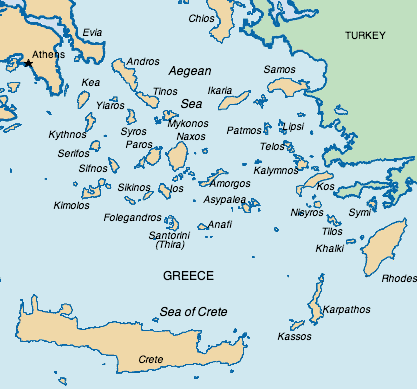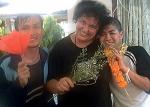Santorini & Sifnos

As the ferry approached the island through the caldera you see a red-brown black and pumice grey terraced cliff face that looms hundreds of feet above the water with brilliant-white buildings with blue trim reflecting the Aegean Sea hanging off the side. But all those beautiful buildings hanging off the cliffs of Santorini, as it turns out, are all hotels, boutique shops, cafes and restaurants with a few blue domed Byzantine churches mixed in.
Walked into a cafe for breakfast of coffee and pastry the first morning to the sounds of Portland’s own Pink Martini playing on the stereo. While walking around the town-Bob in his perennial shorts-we passed a group of Spanish teenagers and one was heard in English “look at that guy-he’s wearing shorts-makes no sense! Do you think it made any impression on Bob?
After exploring the island’s archaelogical and historical sites and lying on black sand beaches there was not much else to do unless you were twenty years old and wanted to spend all night in the discos-so we ferried it six hours to another, smaller island-Sifnos.
Sifnos
At the harbor port of Kamares we took a bus the five miles up a windy road to Apollonia where we checked late into the Sifnos Hotel-tired and hungry. There was only one other patron in the hotel, a French publisher who returns to the island every spring. Apostolos, the hotel proprietor, welcomed us each with an Ouzo. Then he treated the French woman and Bob and I with Mezedhes (appetizers) and we sat for the next two hours eating and talking culture and politics. This is what I had been waiting for! Marie, the French publisher was reading the memoirs of Edward W. Said the professor at Columbia University whose books are popular reading these days for an understanding of the middle east.
Apollonia is an amalgam of three very charming hilltop villages with connecting white-washed buildings with flower-draped balconies lining immaculate narrow marble footways. The people actually live and work here and one gets the feeling this is how they prefer things. The shops are only open during the summer so most of the locals have other work the remainder of the year, Apostolos says.
Sifnos is 16km by 8km-great for walking-so Bob took off the next day for a five hour walk following a trail with one great view after another along the way up to an acropolis with a church and some ruins from 600BC. Almost the entire island was terraced 2-3000 years ago when the islanders supported themselves with agricultural products but since the advent of tourism and vehicle ferries the walled terraces now mostly grow yellow and white daisies and blood-red poppies and support the lonely burro and the goats. It is interesting that the people built their town in and around the many ruins; Greece taking for granted its antiquity.
This island has given us a welcome respite from noise and activity; none of the shops were open yet and their owners were painting, sweeping, repairing all over-preparing for the summer-eager and hopeful.
Apostolos says the Greek Orthodox church is very powerful in Greece-and very conservative-legislating every aspect of family life which is the all-important institution next to the church. Families stay together always-even if/when children move away there is almost daily contact, he says. Marie, the French lady said that yes, the Greeks seem open and friendly but there it stops-they are very clannish and no one on the outside gets into the inner circles. She and Apostolos recommend reading “Three Summers” by Margareta Liberaki published also in English.
Women
My sense about the young women I have seen especially in the less developed countries of Spain, Portugal, Morocco and Greece is that they are a pretty savvy lot. Nothing will hold them back now!
As there was a strike on the day we planned to take the ferry back to Athens, we asked Apostolos if we could have the hotel room for the afternoon. “Of course, of course,” he says, “life is simple, life is simple!” When we were ready to leave, he gave us each a going away drink of Ouzo. I don’t want to leave this place…I am grateful for this journey; I have learned these ways so far to say thank you: Greek-efsharisto, Spanish-Gracias, French-merci, Portuguese-obrigado/a, Italian-grazie.
Back in Athens, I sat in the internet cafe with a young Anglican priest from Britain who was bicycling his way to Haifa Israel. Not worried, he said. The other fellow, was a UN Police Observer from South Bend, Indiana stationed in Kosovo making 90,000 a year. He was in Athens on leave. Meeting people like this is one of the reasons I like going to Internet cafes.
Tags: Best Places, Boats, Climbs & Walks, Culture, Europe, Greece, Hostels & Guesthouses, Hotels, Hotels,Hostels & Guesthouses, Reading, Santorini, Touching Experiences


Leave a Reply